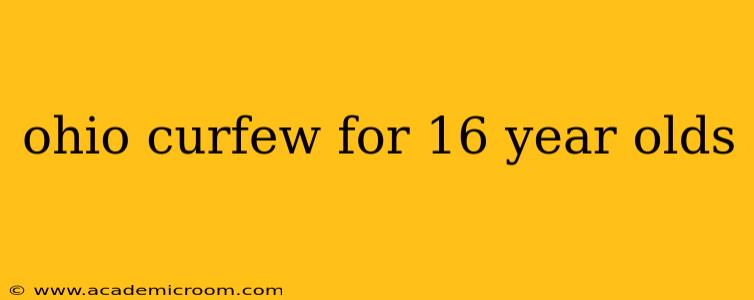Ohio's laws regarding curfews for minors can be complex and vary depending on the specific municipality. While there isn't a statewide curfew specifically targeting 16-year-olds, many cities and counties have their own local ordinances. This means understanding the curfew laws requires checking both the state level and your local regulations. This guide will help you navigate this process.
What is the Ohio State Law Regarding Minors and Curfews?
Ohio doesn't have a statewide curfew law applicable to all minors. Instead, the state leaves it to individual cities and counties to enact their own local ordinances. This means that the curfew rules can vary significantly depending on your location within Ohio. Some areas may not have a curfew at all, while others may have strict regulations.
What are the Curfew Laws in My City or County?
This is the crucial question. To find out the specific curfew laws in your area, you should:
- Check your local government's website: Most cities and counties will publish their ordinances online, often under sections dedicated to "laws," "ordinances," or "municipal code." Search for terms like "minor curfew," "juvenile curfew," or "curfew ordinance."
- Contact your local police department: They're the best resource for accurate and up-to-date information on curfew enforcement in your area.
- Consult your city or county clerk's office: These offices maintain official records of local laws and regulations.
What Exceptions Might Apply to a 16-Year-Old Curfew?
Even if your city or county has a curfew, there are usually exceptions. These commonly include:
- Accompanied by a parent or guardian: Being with a responsible adult often negates the curfew.
- Working: Legitimate employment, such as a part-time job, usually provides an exemption.
- Emergency situations: A medical emergency or similar urgent situation would be a valid reason to be out past curfew.
- School-related activities: Participation in school events, sports, or other sanctioned activities usually grants an exemption.
What are the Penalties for Violating a Curfew?
Penalties for violating a curfew can vary widely depending on your location and the specifics of the offense. These could include:
- Warnings: First-time offenders may receive only a warning.
- Fines: Subsequent violations might result in fines for the minor or their parents/guardians.
- Community service: Some jurisdictions might impose community service hours.
- Detention or other legal consequences: In more serious or repeated cases, more severe consequences may apply. This is highly dependent on the local ordinances and the specific circumstances.
What if a 16-Year-Old is Stopped by Police for Curfew Violation?
If a 16-year-old is stopped by police for a possible curfew violation, it's crucial to remain calm and cooperative. They should:
- Identify themselves politely and truthfully.
- Explain their reason for being out past curfew.
- Provide identification, if requested.
- Contact a parent or guardian immediately.
Are there different curfews for weekdays and weekends?
Yes, many local ordinances differentiate between weekday and weekend curfews. Weekends often have later curfew times than weekdays. Always check your specific local ordinances for exact details.
Does the curfew apply regardless of the activity?
No. As mentioned earlier, many valid exemptions exist, such as work, school activities, and being with a parent or guardian. The specific circumstances of the situation will be taken into account.
This information is for general guidance only and does not constitute legal advice. Always refer to your specific city or county ordinances and consult with legal professionals for any legal concerns. Staying informed about your local laws is crucial for both minors and their parents/guardians.
